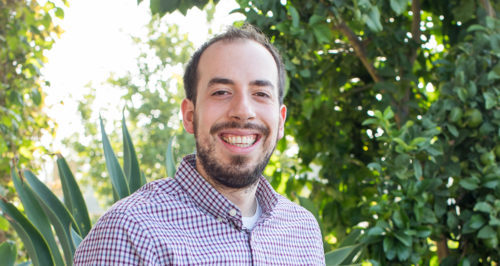Uncovering New Signals of Long-Lived Particles
October 4, 2019
When Harvey Mudd College physics professor Brian Shuve began studying long-lived particles (LLPs) five or six years ago, the concept was somewhat of a fringe idea. Was it possible that particle collisions within the Large Hadron Collider (LHC) were throwing off new particles that slipped unnoticed past LHC detectors and that those particles could hold answers to unsolved mysteries about the nature of the universe?
“The reason I started going in this direction of LLPs was that it seemed like no matter what question I was working on theoretically, whatever new forces or particles we were considering, they fell into this new category,” he says.
Shuve says that this particular class of particles is tricky to spot. Unlike most signals of new particles at colliders, they pass undetected through different parts of the detector (hence, “long-lived”). Instead, they decay randomly in unexpected places well away from where they are produced, making them hard to re-construct and potentially looking like “noise” in the detector.
“Known physics can’t yet explain why the universe contains more matter than antimatter, because we have an incomplete understanding of the nature of forces that exist,” he says. But Shuve and his colleagues suspected that answers might be hiding in plain sight within the massive data sets recorded during LHC experiments.
A recent burst of interest in the study of long-lived particle theory finds Shuve well-positioned to share his research; he recently published three papers on the topic.
Working with James Beacham, an experimentalist at Duke University and the European Organization for Nuclear Research (CERN), Shuve co-edited “Searching for long-lived particles beyond the Standard Model at the Large Hadron Collider”, which was accepted in the Journal of Physics G. “We led a large collaboration of approximately 20 editors and 200 other physicists, both theorists and experimentalists, to do a comprehensive study of how to look for these kinds of particles,” Shuve says, noting that the research is already making an impact, with 38 citations of the posted article within its first six months. “Given the non-standard nature of LLPs, a comprehensive overview of LLP signatures at the LHC is beneficial to ensure that possible avenues of new physics discoveries are not overlooked,” he says.
“Long-Lived Particles at the Energy Frontier: The MATHUSLA Physics Case” was accepted to Reports on Progress in Physics. “This is the work of a large collaboration of theorists working to figure out exactly what theories predict the existence of long-lived particles and why those theories predict LLPs,” Shuve says. “Apart from doing some of the theory work, I also was a co-editor responsible for one of the main sections of the paper (on theories predicting neutrino masses).”
The most recent paper, “Discovering True Muonium at LHCb” was published in Physical Review D. “I worked with a theorist at CERN and several experimentalists who are part of the Large Hadron Collider beauty experiment (LHCb) collaboration there. We showed that a particle called true muonium, which is predicted by the current theory of particle physics but has not yet been discovered, can be detected as a long-lived particle at the LHCb experiment. It’s the first study showing that this can be done realistically,” Shuve says.
Shuve credits his faculty position at Harvey Mudd and the flexibility it offers as one reason for his involvement across such a wide breadth of LLP research. Shuve helped found the LHC LLP Community, which seeks to foster new connections and break new ground.
“I saw that I could make more impact by organizing a group like this than by just doing my own research alone,” he says. “Being at Harvey Mudd allowed me to do that.” He says that it benefits Harvey Mudd students because he can connect them to this network of physicists, which can lead to incredible opportunities for them to do summer research and post-graduate research.
In addition to organizing workshops twice a year for the LHC LLP Community, Shuve is conducting LLP research at HMC with Mason Acevedo ’22 and Ngan Nguyen ’21 and supervising senior Duncan Rocha’s thesis on experimental work on LLPs. “It’s about creating a community-wide effort that gives all the theoretical motivations for why these particles are out there,” he says.
